Financial Analysis and Resource Management Report: The City Hotel
VerifiedAdded on 2020/01/28
|17
|3774
|47
Report
AI Summary
This report provides a comprehensive financial analysis of The City Hotel, focusing on managing financial resources and making informed decisions. It explores various sources of finance, including internal and external options like retained profits, bank loans, and leasing, and their implications for the hotel. The report delves into the cost of funding, comparing debt and equity financing, and emphasizes the importance of financial planning. It includes a detailed cash budget for the hotel, unit cost calculations, and an assessment of the viability of hotel expansion in London, Manchester, and Cambridge, utilizing net present value and payback period analyses. Furthermore, the report presents financial statements and a comparative analysis of two firms, along with key ratio analysis to evaluate the hotel's financial performance and make strategic recommendations. The analysis considers the perspective of various stakeholders, including finance executives, suppliers, and the impact of government tax, to offer a holistic view of the hotel's financial health and future prospects.
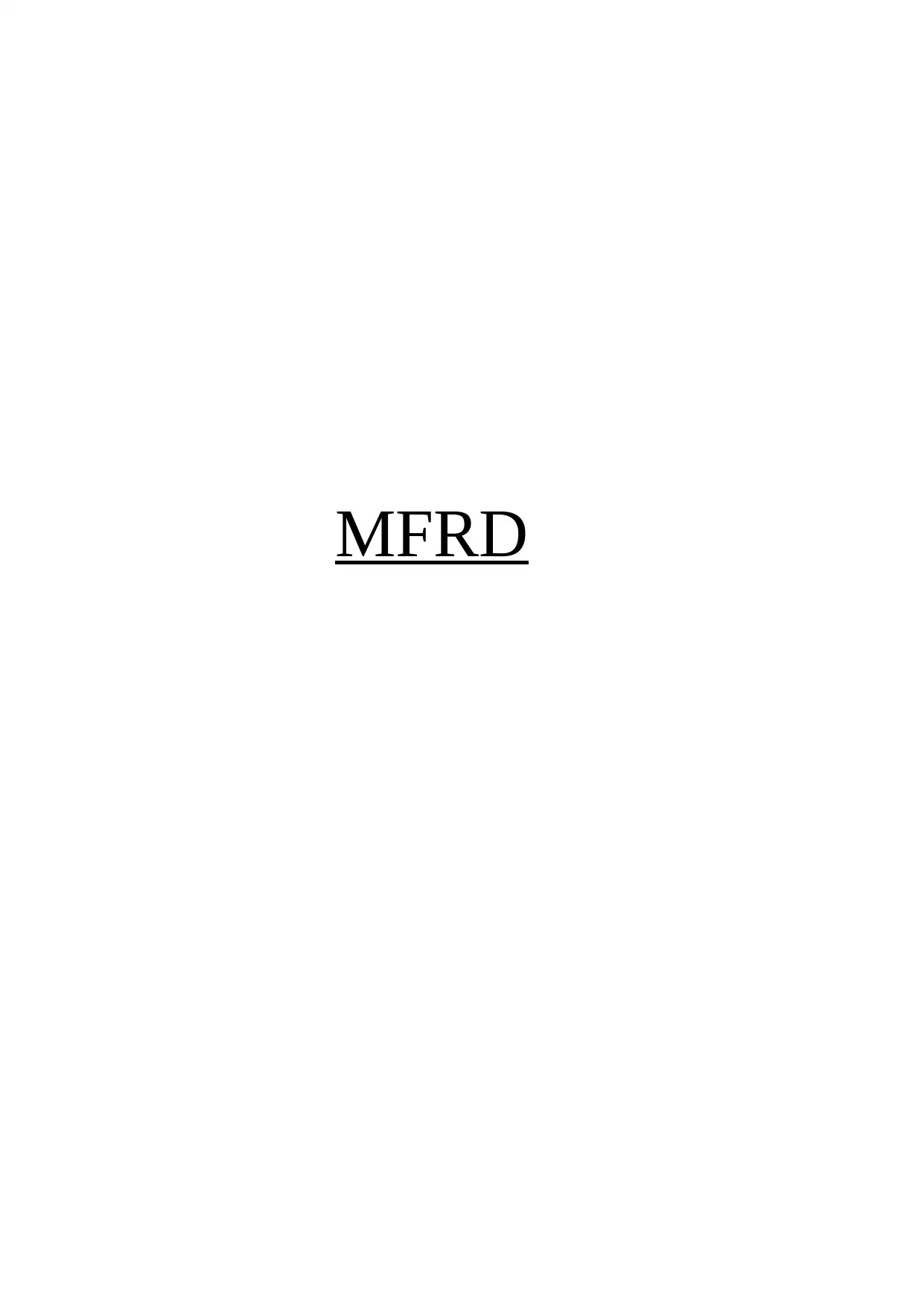
MFRD
Paraphrase This Document
Need a fresh take? Get an instant paraphrase of this document with our AI Paraphraser
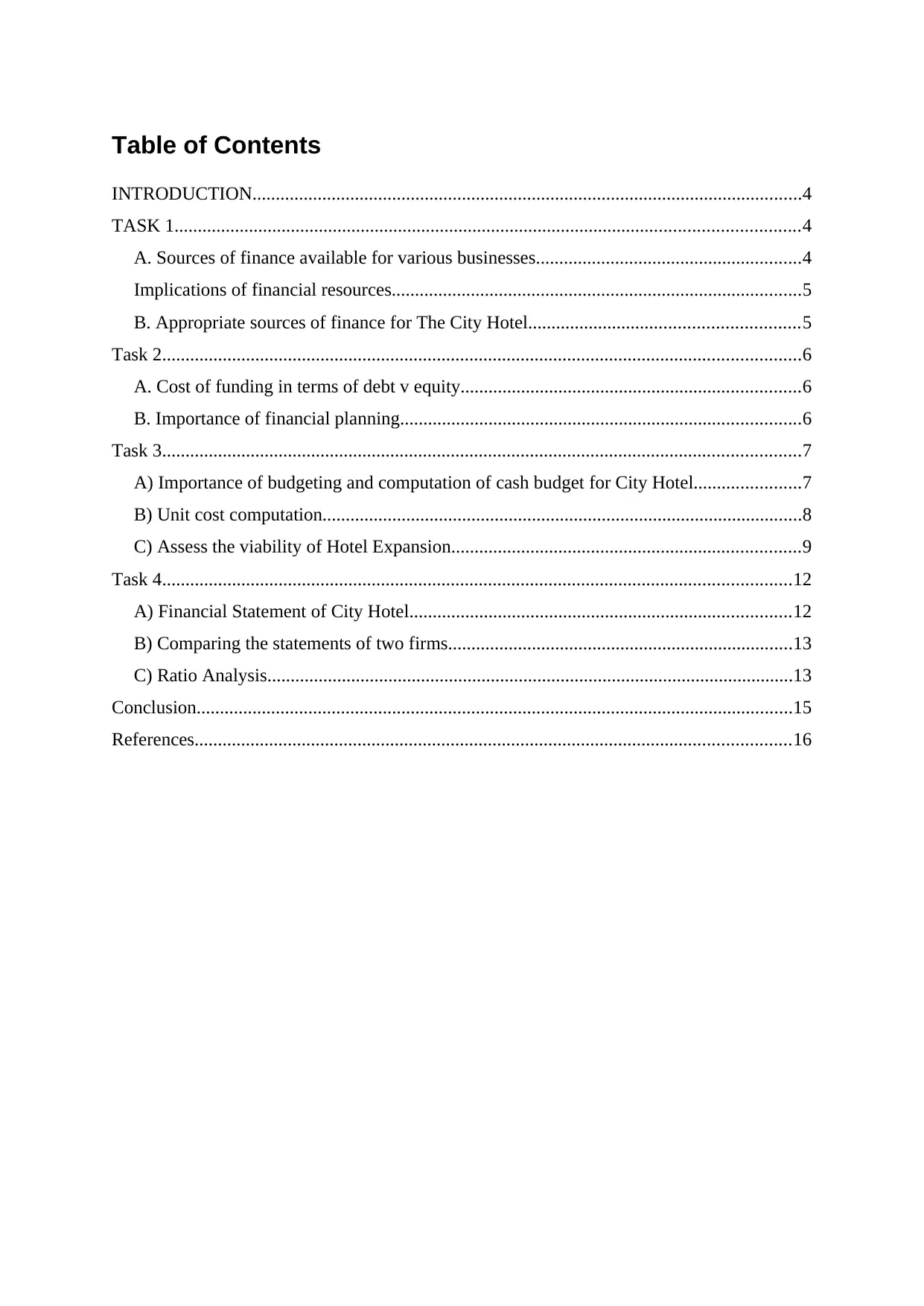
Table of Contents
INTRODUCTION......................................................................................................................4
TASK 1......................................................................................................................................4
A. Sources of finance available for various businesses.........................................................4
Implications of financial resources........................................................................................5
B. Appropriate sources of finance for The City Hotel..........................................................5
Task 2.........................................................................................................................................6
A. Cost of funding in terms of debt v equity.........................................................................6
B. Importance of financial planning......................................................................................6
Task 3.........................................................................................................................................7
A) Importance of budgeting and computation of cash budget for City Hotel.......................7
B) Unit cost computation.......................................................................................................8
C) Assess the viability of Hotel Expansion...........................................................................9
Task 4.......................................................................................................................................12
A) Financial Statement of City Hotel..................................................................................12
B) Comparing the statements of two firms..........................................................................13
C) Ratio Analysis.................................................................................................................13
Conclusion................................................................................................................................15
References................................................................................................................................16
INTRODUCTION......................................................................................................................4
TASK 1......................................................................................................................................4
A. Sources of finance available for various businesses.........................................................4
Implications of financial resources........................................................................................5
B. Appropriate sources of finance for The City Hotel..........................................................5
Task 2.........................................................................................................................................6
A. Cost of funding in terms of debt v equity.........................................................................6
B. Importance of financial planning......................................................................................6
Task 3.........................................................................................................................................7
A) Importance of budgeting and computation of cash budget for City Hotel.......................7
B) Unit cost computation.......................................................................................................8
C) Assess the viability of Hotel Expansion...........................................................................9
Task 4.......................................................................................................................................12
A) Financial Statement of City Hotel..................................................................................12
B) Comparing the statements of two firms..........................................................................13
C) Ratio Analysis.................................................................................................................13
Conclusion................................................................................................................................15
References................................................................................................................................16
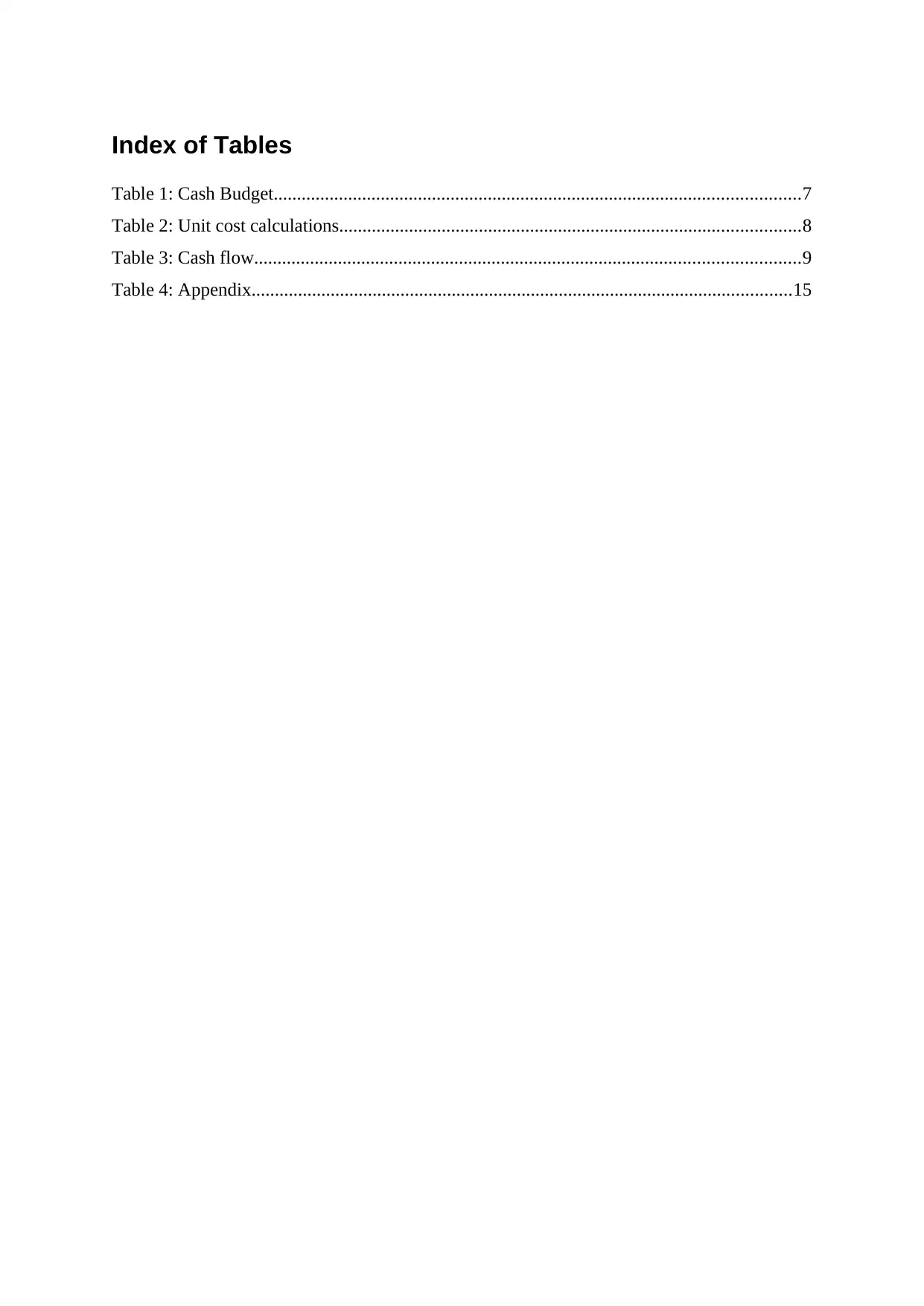
Index of Tables
Table 1: Cash Budget.................................................................................................................7
Table 2: Unit cost calculations...................................................................................................8
Table 3: Cash flow.....................................................................................................................9
Table 4: Appendix....................................................................................................................15
Table 1: Cash Budget.................................................................................................................7
Table 2: Unit cost calculations...................................................................................................8
Table 3: Cash flow.....................................................................................................................9
Table 4: Appendix....................................................................................................................15
⊘ This is a preview!⊘
Do you want full access?
Subscribe today to unlock all pages.

Trusted by 1+ million students worldwide
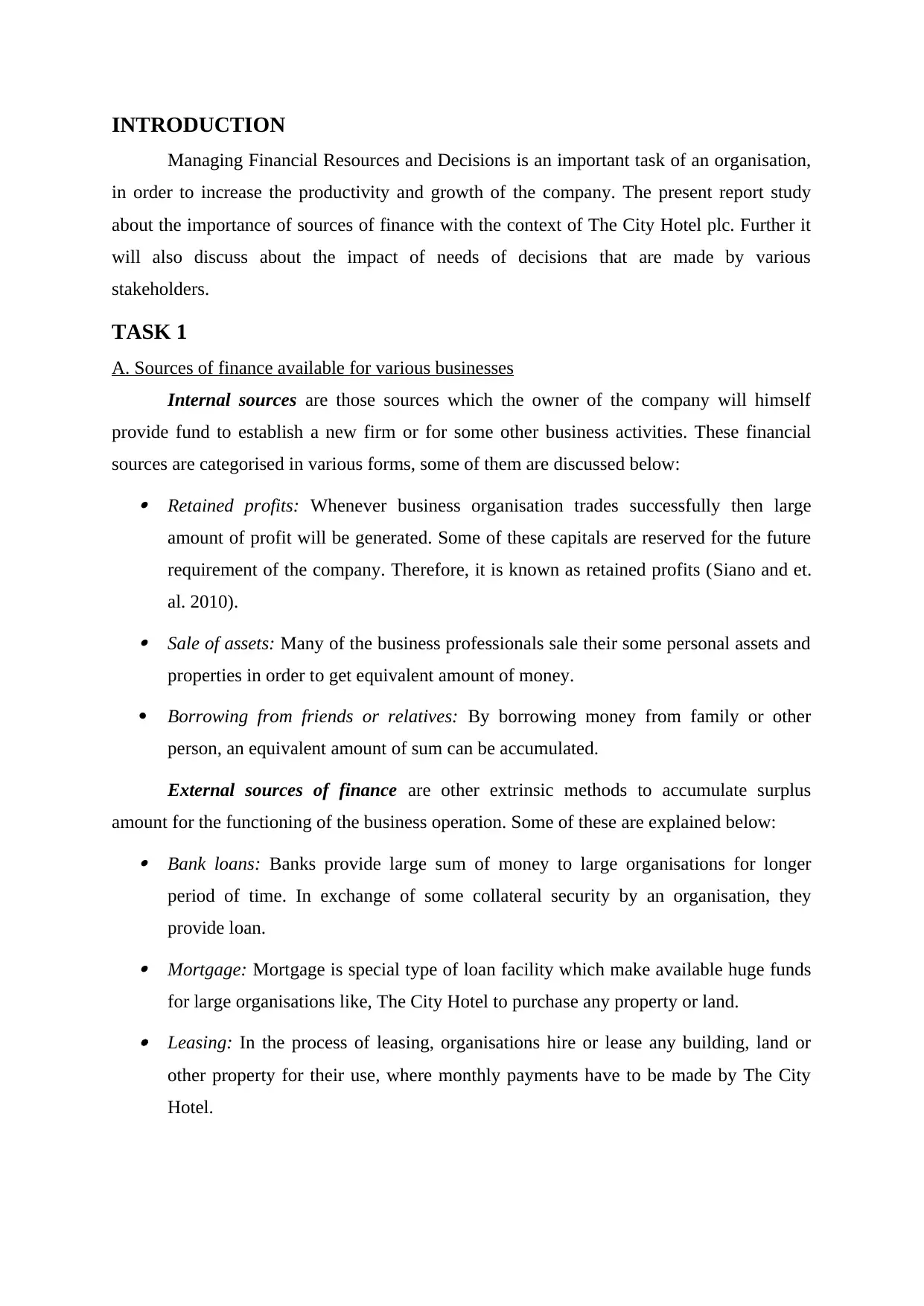
INTRODUCTION
Managing Financial Resources and Decisions is an important task of an organisation,
in order to increase the productivity and growth of the company. The present report study
about the importance of sources of finance with the context of The City Hotel plc. Further it
will also discuss about the impact of needs of decisions that are made by various
stakeholders.
TASK 1
A. Sources of finance available for various businesses
Internal sources are those sources which the owner of the company will himself
provide fund to establish a new firm or for some other business activities. These financial
sources are categorised in various forms, some of them are discussed below: Retained profits: Whenever business organisation trades successfully then large
amount of profit will be generated. Some of these capitals are reserved for the future
requirement of the company. Therefore, it is known as retained profits (Siano and et.
al. 2010). Sale of assets: Many of the business professionals sale their some personal assets and
properties in order to get equivalent amount of money.
Borrowing from friends or relatives: By borrowing money from family or other
person, an equivalent amount of sum can be accumulated.
External sources of finance are other extrinsic methods to accumulate surplus
amount for the functioning of the business operation. Some of these are explained below: Bank loans: Banks provide large sum of money to large organisations for longer
period of time. In exchange of some collateral security by an organisation, they
provide loan. Mortgage: Mortgage is special type of loan facility which make available huge funds
for large organisations like, The City Hotel to purchase any property or land. Leasing: In the process of leasing, organisations hire or lease any building, land or
other property for their use, where monthly payments have to be made by The City
Hotel.
Managing Financial Resources and Decisions is an important task of an organisation,
in order to increase the productivity and growth of the company. The present report study
about the importance of sources of finance with the context of The City Hotel plc. Further it
will also discuss about the impact of needs of decisions that are made by various
stakeholders.
TASK 1
A. Sources of finance available for various businesses
Internal sources are those sources which the owner of the company will himself
provide fund to establish a new firm or for some other business activities. These financial
sources are categorised in various forms, some of them are discussed below: Retained profits: Whenever business organisation trades successfully then large
amount of profit will be generated. Some of these capitals are reserved for the future
requirement of the company. Therefore, it is known as retained profits (Siano and et.
al. 2010). Sale of assets: Many of the business professionals sale their some personal assets and
properties in order to get equivalent amount of money.
Borrowing from friends or relatives: By borrowing money from family or other
person, an equivalent amount of sum can be accumulated.
External sources of finance are other extrinsic methods to accumulate surplus
amount for the functioning of the business operation. Some of these are explained below: Bank loans: Banks provide large sum of money to large organisations for longer
period of time. In exchange of some collateral security by an organisation, they
provide loan. Mortgage: Mortgage is special type of loan facility which make available huge funds
for large organisations like, The City Hotel to purchase any property or land. Leasing: In the process of leasing, organisations hire or lease any building, land or
other property for their use, where monthly payments have to be made by The City
Hotel.
Paraphrase This Document
Need a fresh take? Get an instant paraphrase of this document with our AI Paraphraser
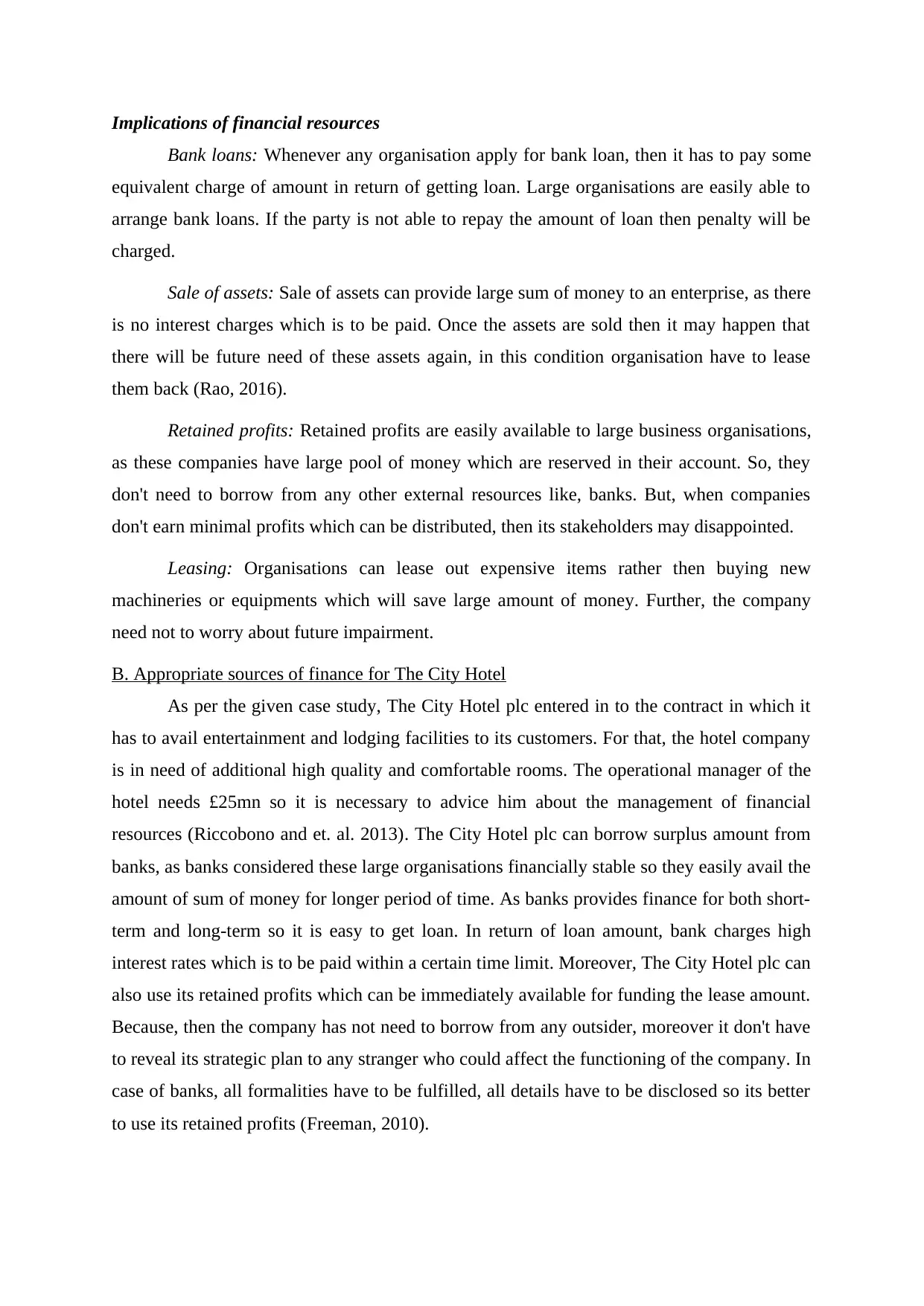
Implications of financial resources
Bank loans: Whenever any organisation apply for bank loan, then it has to pay some
equivalent charge of amount in return of getting loan. Large organisations are easily able to
arrange bank loans. If the party is not able to repay the amount of loan then penalty will be
charged.
Sale of assets: Sale of assets can provide large sum of money to an enterprise, as there
is no interest charges which is to be paid. Once the assets are sold then it may happen that
there will be future need of these assets again, in this condition organisation have to lease
them back (Rao, 2016).
Retained profits: Retained profits are easily available to large business organisations,
as these companies have large pool of money which are reserved in their account. So, they
don't need to borrow from any other external resources like, banks. But, when companies
don't earn minimal profits which can be distributed, then its stakeholders may disappointed.
Leasing: Organisations can lease out expensive items rather then buying new
machineries or equipments which will save large amount of money. Further, the company
need not to worry about future impairment.
B. Appropriate sources of finance for The City Hotel
As per the given case study, The City Hotel plc entered in to the contract in which it
has to avail entertainment and lodging facilities to its customers. For that, the hotel company
is in need of additional high quality and comfortable rooms. The operational manager of the
hotel needs £25mn so it is necessary to advice him about the management of financial
resources (Riccobono and et. al. 2013). The City Hotel plc can borrow surplus amount from
banks, as banks considered these large organisations financially stable so they easily avail the
amount of sum of money for longer period of time. As banks provides finance for both short-
term and long-term so it is easy to get loan. In return of loan amount, bank charges high
interest rates which is to be paid within a certain time limit. Moreover, The City Hotel plc can
also use its retained profits which can be immediately available for funding the lease amount.
Because, then the company has not need to borrow from any outsider, moreover it don't have
to reveal its strategic plan to any stranger who could affect the functioning of the company. In
case of banks, all formalities have to be fulfilled, all details have to be disclosed so its better
to use its retained profits (Freeman, 2010).
Bank loans: Whenever any organisation apply for bank loan, then it has to pay some
equivalent charge of amount in return of getting loan. Large organisations are easily able to
arrange bank loans. If the party is not able to repay the amount of loan then penalty will be
charged.
Sale of assets: Sale of assets can provide large sum of money to an enterprise, as there
is no interest charges which is to be paid. Once the assets are sold then it may happen that
there will be future need of these assets again, in this condition organisation have to lease
them back (Rao, 2016).
Retained profits: Retained profits are easily available to large business organisations,
as these companies have large pool of money which are reserved in their account. So, they
don't need to borrow from any other external resources like, banks. But, when companies
don't earn minimal profits which can be distributed, then its stakeholders may disappointed.
Leasing: Organisations can lease out expensive items rather then buying new
machineries or equipments which will save large amount of money. Further, the company
need not to worry about future impairment.
B. Appropriate sources of finance for The City Hotel
As per the given case study, The City Hotel plc entered in to the contract in which it
has to avail entertainment and lodging facilities to its customers. For that, the hotel company
is in need of additional high quality and comfortable rooms. The operational manager of the
hotel needs £25mn so it is necessary to advice him about the management of financial
resources (Riccobono and et. al. 2013). The City Hotel plc can borrow surplus amount from
banks, as banks considered these large organisations financially stable so they easily avail the
amount of sum of money for longer period of time. As banks provides finance for both short-
term and long-term so it is easy to get loan. In return of loan amount, bank charges high
interest rates which is to be paid within a certain time limit. Moreover, The City Hotel plc can
also use its retained profits which can be immediately available for funding the lease amount.
Because, then the company has not need to borrow from any outsider, moreover it don't have
to reveal its strategic plan to any stranger who could affect the functioning of the company. In
case of banks, all formalities have to be fulfilled, all details have to be disclosed so its better
to use its retained profits (Freeman, 2010).
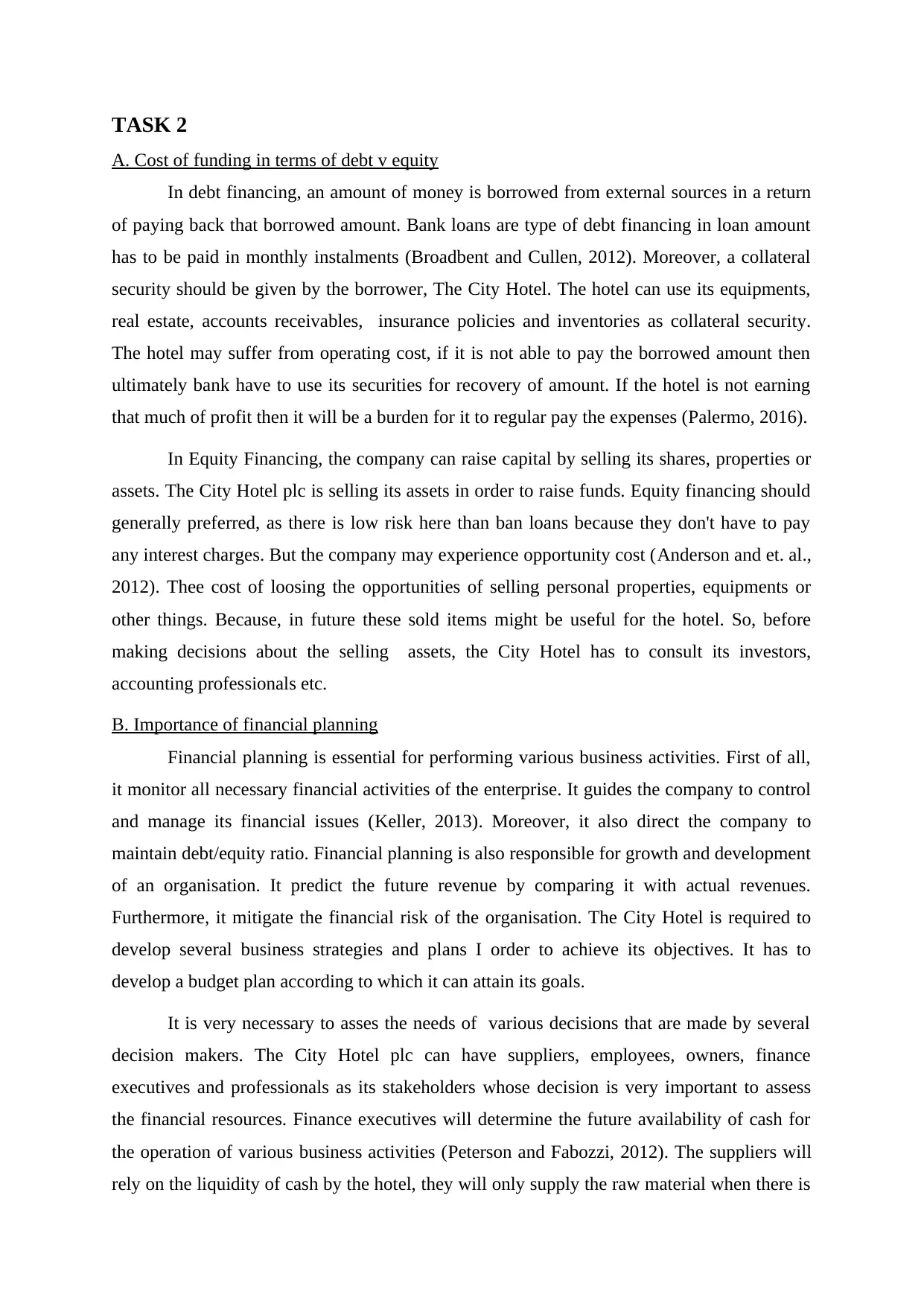
TASK 2
A. Cost of funding in terms of debt v equity
In debt financing, an amount of money is borrowed from external sources in a return
of paying back that borrowed amount. Bank loans are type of debt financing in loan amount
has to be paid in monthly instalments (Broadbent and Cullen, 2012). Moreover, a collateral
security should be given by the borrower, The City Hotel. The hotel can use its equipments,
real estate, accounts receivables, insurance policies and inventories as collateral security.
The hotel may suffer from operating cost, if it is not able to pay the borrowed amount then
ultimately bank have to use its securities for recovery of amount. If the hotel is not earning
that much of profit then it will be a burden for it to regular pay the expenses (Palermo, 2016).
In Equity Financing, the company can raise capital by selling its shares, properties or
assets. The City Hotel plc is selling its assets in order to raise funds. Equity financing should
generally preferred, as there is low risk here than ban loans because they don't have to pay
any interest charges. But the company may experience opportunity cost (Anderson and et. al.,
2012). Thee cost of loosing the opportunities of selling personal properties, equipments or
other things. Because, in future these sold items might be useful for the hotel. So, before
making decisions about the selling assets, the City Hotel has to consult its investors,
accounting professionals etc.
B. Importance of financial planning
Financial planning is essential for performing various business activities. First of all,
it monitor all necessary financial activities of the enterprise. It guides the company to control
and manage its financial issues (Keller, 2013). Moreover, it also direct the company to
maintain debt/equity ratio. Financial planning is also responsible for growth and development
of an organisation. It predict the future revenue by comparing it with actual revenues.
Furthermore, it mitigate the financial risk of the organisation. The City Hotel is required to
develop several business strategies and plans I order to achieve its objectives. It has to
develop a budget plan according to which it can attain its goals.
It is very necessary to asses the needs of various decisions that are made by several
decision makers. The City Hotel plc can have suppliers, employees, owners, finance
executives and professionals as its stakeholders whose decision is very important to assess
the financial resources. Finance executives will determine the future availability of cash for
the operation of various business activities (Peterson and Fabozzi, 2012). The suppliers will
rely on the liquidity of cash by the hotel, they will only supply the raw material when there is
A. Cost of funding in terms of debt v equity
In debt financing, an amount of money is borrowed from external sources in a return
of paying back that borrowed amount. Bank loans are type of debt financing in loan amount
has to be paid in monthly instalments (Broadbent and Cullen, 2012). Moreover, a collateral
security should be given by the borrower, The City Hotel. The hotel can use its equipments,
real estate, accounts receivables, insurance policies and inventories as collateral security.
The hotel may suffer from operating cost, if it is not able to pay the borrowed amount then
ultimately bank have to use its securities for recovery of amount. If the hotel is not earning
that much of profit then it will be a burden for it to regular pay the expenses (Palermo, 2016).
In Equity Financing, the company can raise capital by selling its shares, properties or
assets. The City Hotel plc is selling its assets in order to raise funds. Equity financing should
generally preferred, as there is low risk here than ban loans because they don't have to pay
any interest charges. But the company may experience opportunity cost (Anderson and et. al.,
2012). Thee cost of loosing the opportunities of selling personal properties, equipments or
other things. Because, in future these sold items might be useful for the hotel. So, before
making decisions about the selling assets, the City Hotel has to consult its investors,
accounting professionals etc.
B. Importance of financial planning
Financial planning is essential for performing various business activities. First of all,
it monitor all necessary financial activities of the enterprise. It guides the company to control
and manage its financial issues (Keller, 2013). Moreover, it also direct the company to
maintain debt/equity ratio. Financial planning is also responsible for growth and development
of an organisation. It predict the future revenue by comparing it with actual revenues.
Furthermore, it mitigate the financial risk of the organisation. The City Hotel is required to
develop several business strategies and plans I order to achieve its objectives. It has to
develop a budget plan according to which it can attain its goals.
It is very necessary to asses the needs of various decisions that are made by several
decision makers. The City Hotel plc can have suppliers, employees, owners, finance
executives and professionals as its stakeholders whose decision is very important to assess
the financial resources. Finance executives will determine the future availability of cash for
the operation of various business activities (Peterson and Fabozzi, 2012). The suppliers will
rely on the liquidity of cash by the hotel, they will only supply the raw material when there is
⊘ This is a preview!⊘
Do you want full access?
Subscribe today to unlock all pages.

Trusted by 1+ million students worldwide
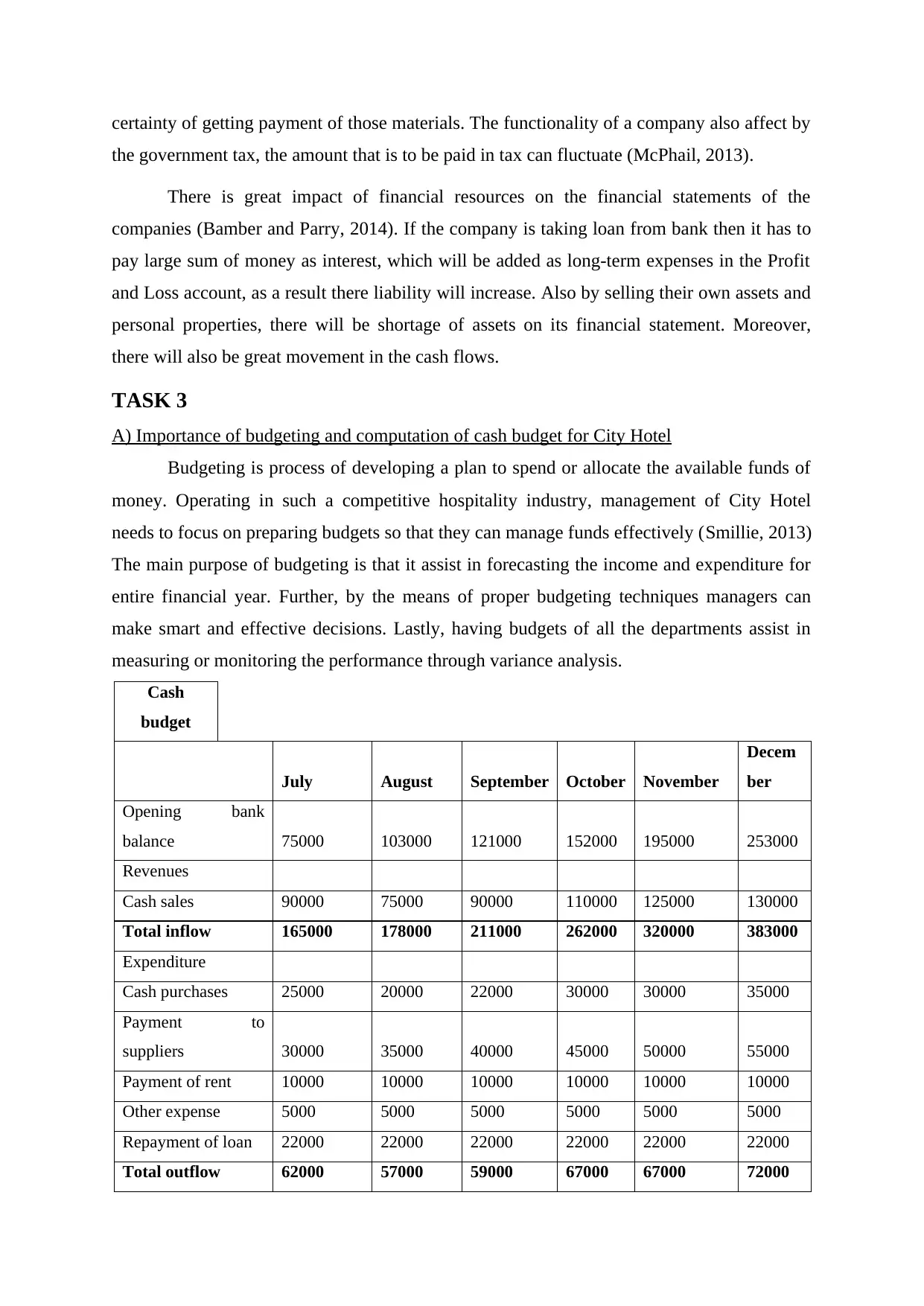
certainty of getting payment of those materials. The functionality of a company also affect by
the government tax, the amount that is to be paid in tax can fluctuate (McPhail, 2013).
There is great impact of financial resources on the financial statements of the
companies (Bamber and Parry, 2014). If the company is taking loan from bank then it has to
pay large sum of money as interest, which will be added as long-term expenses in the Profit
and Loss account, as a result there liability will increase. Also by selling their own assets and
personal properties, there will be shortage of assets on its financial statement. Moreover,
there will also be great movement in the cash flows.
TASK 3
A) Importance of budgeting and computation of cash budget for City Hotel
Budgeting is process of developing a plan to spend or allocate the available funds of
money. Operating in such a competitive hospitality industry, management of City Hotel
needs to focus on preparing budgets so that they can manage funds effectively (Smillie, 2013)
The main purpose of budgeting is that it assist in forecasting the income and expenditure for
entire financial year. Further, by the means of proper budgeting techniques managers can
make smart and effective decisions. Lastly, having budgets of all the departments assist in
measuring or monitoring the performance through variance analysis.
Cash
budget
July August September October November
Decem
ber
Opening bank
balance 75000 103000 121000 152000 195000 253000
Revenues
Cash sales 90000 75000 90000 110000 125000 130000
Total inflow 165000 178000 211000 262000 320000 383000
Expenditure
Cash purchases 25000 20000 22000 30000 30000 35000
Payment to
suppliers 30000 35000 40000 45000 50000 55000
Payment of rent 10000 10000 10000 10000 10000 10000
Other expense 5000 5000 5000 5000 5000 5000
Repayment of loan 22000 22000 22000 22000 22000 22000
Total outflow 62000 57000 59000 67000 67000 72000
the government tax, the amount that is to be paid in tax can fluctuate (McPhail, 2013).
There is great impact of financial resources on the financial statements of the
companies (Bamber and Parry, 2014). If the company is taking loan from bank then it has to
pay large sum of money as interest, which will be added as long-term expenses in the Profit
and Loss account, as a result there liability will increase. Also by selling their own assets and
personal properties, there will be shortage of assets on its financial statement. Moreover,
there will also be great movement in the cash flows.
TASK 3
A) Importance of budgeting and computation of cash budget for City Hotel
Budgeting is process of developing a plan to spend or allocate the available funds of
money. Operating in such a competitive hospitality industry, management of City Hotel
needs to focus on preparing budgets so that they can manage funds effectively (Smillie, 2013)
The main purpose of budgeting is that it assist in forecasting the income and expenditure for
entire financial year. Further, by the means of proper budgeting techniques managers can
make smart and effective decisions. Lastly, having budgets of all the departments assist in
measuring or monitoring the performance through variance analysis.
Cash
budget
July August September October November
Decem
ber
Opening bank
balance 75000 103000 121000 152000 195000 253000
Revenues
Cash sales 90000 75000 90000 110000 125000 130000
Total inflow 165000 178000 211000 262000 320000 383000
Expenditure
Cash purchases 25000 20000 22000 30000 30000 35000
Payment to
suppliers 30000 35000 40000 45000 50000 55000
Payment of rent 10000 10000 10000 10000 10000 10000
Other expense 5000 5000 5000 5000 5000 5000
Repayment of loan 22000 22000 22000 22000 22000 22000
Total outflow 62000 57000 59000 67000 67000 72000
Paraphrase This Document
Need a fresh take? Get an instant paraphrase of this document with our AI Paraphraser
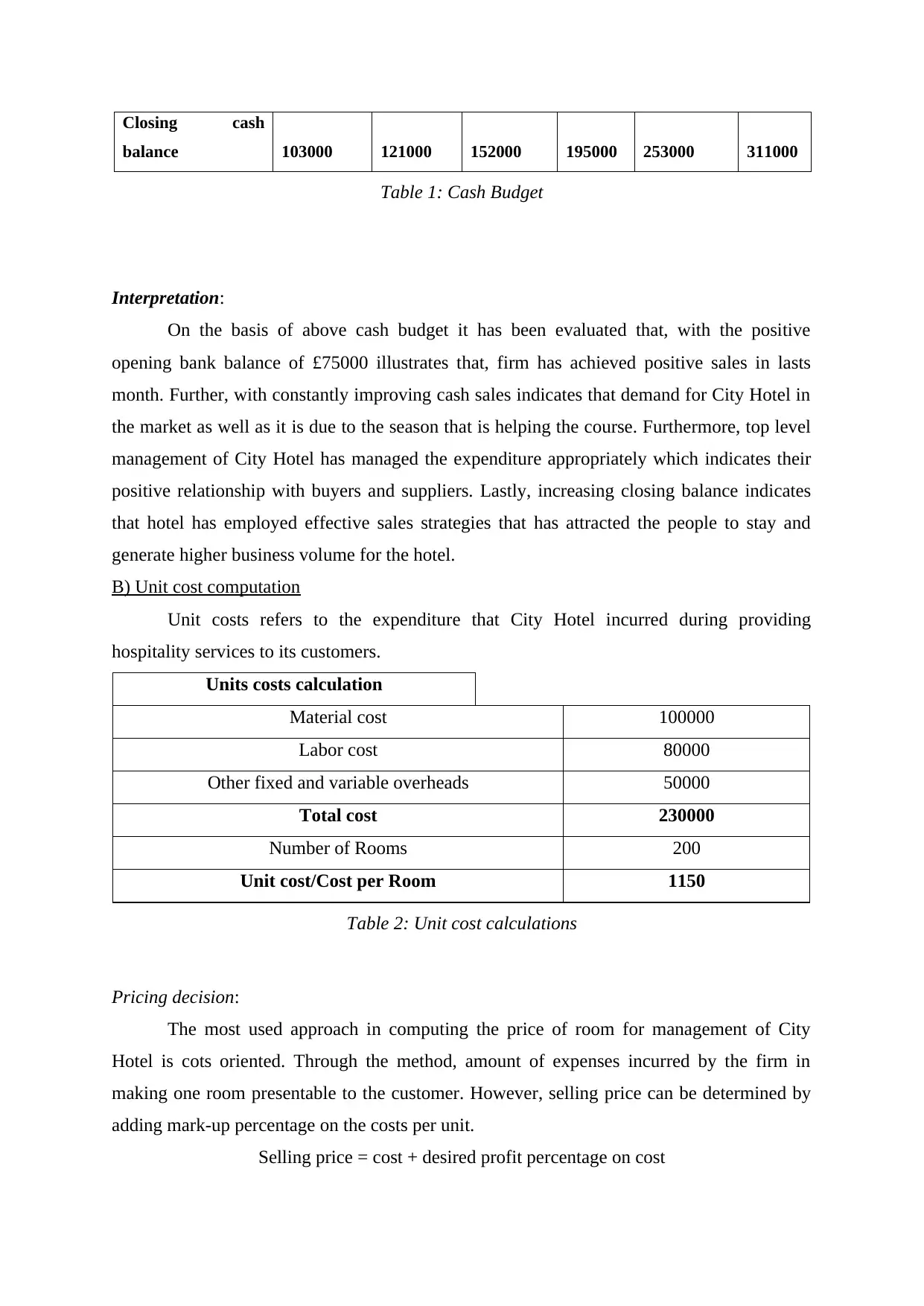
Closing cash
balance 103000 121000 152000 195000 253000 311000
Table 1: Cash Budget
Interpretation:
On the basis of above cash budget it has been evaluated that, with the positive
opening bank balance of £75000 illustrates that, firm has achieved positive sales in lasts
month. Further, with constantly improving cash sales indicates that demand for City Hotel in
the market as well as it is due to the season that is helping the course. Furthermore, top level
management of City Hotel has managed the expenditure appropriately which indicates their
positive relationship with buyers and suppliers. Lastly, increasing closing balance indicates
that hotel has employed effective sales strategies that has attracted the people to stay and
generate higher business volume for the hotel.
B) Unit cost computation
Unit costs refers to the expenditure that City Hotel incurred during providing
hospitality services to its customers.
Units costs calculation
Material cost 100000
Labor cost 80000
Other fixed and variable overheads 50000
Total cost 230000
Number of Rooms 200
Unit cost/Cost per Room 1150
Table 2: Unit cost calculations
Pricing decision:
The most used approach in computing the price of room for management of City
Hotel is cots oriented. Through the method, amount of expenses incurred by the firm in
making one room presentable to the customer. However, selling price can be determined by
adding mark-up percentage on the costs per unit.
Selling price = cost + desired profit percentage on cost
balance 103000 121000 152000 195000 253000 311000
Table 1: Cash Budget
Interpretation:
On the basis of above cash budget it has been evaluated that, with the positive
opening bank balance of £75000 illustrates that, firm has achieved positive sales in lasts
month. Further, with constantly improving cash sales indicates that demand for City Hotel in
the market as well as it is due to the season that is helping the course. Furthermore, top level
management of City Hotel has managed the expenditure appropriately which indicates their
positive relationship with buyers and suppliers. Lastly, increasing closing balance indicates
that hotel has employed effective sales strategies that has attracted the people to stay and
generate higher business volume for the hotel.
B) Unit cost computation
Unit costs refers to the expenditure that City Hotel incurred during providing
hospitality services to its customers.
Units costs calculation
Material cost 100000
Labor cost 80000
Other fixed and variable overheads 50000
Total cost 230000
Number of Rooms 200
Unit cost/Cost per Room 1150
Table 2: Unit cost calculations
Pricing decision:
The most used approach in computing the price of room for management of City
Hotel is cots oriented. Through the method, amount of expenses incurred by the firm in
making one room presentable to the customer. However, selling price can be determined by
adding mark-up percentage on the costs per unit.
Selling price = cost + desired profit percentage on cost
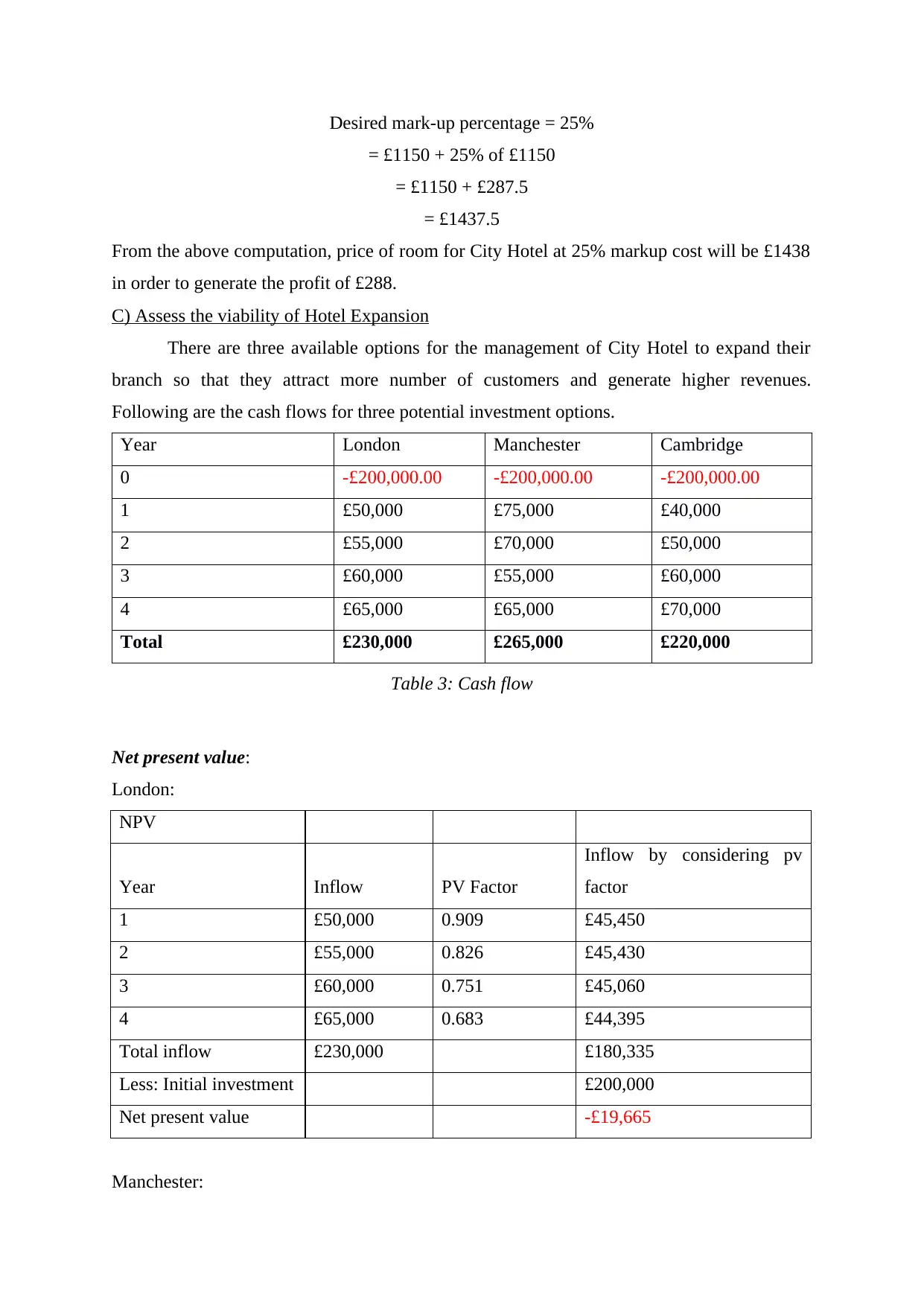
Desired mark-up percentage = 25%
= £1150 + 25% of £1150
= £1150 + £287.5
= £1437.5
From the above computation, price of room for City Hotel at 25% markup cost will be £1438
in order to generate the profit of £288.
C) Assess the viability of Hotel Expansion
There are three available options for the management of City Hotel to expand their
branch so that they attract more number of customers and generate higher revenues.
Following are the cash flows for three potential investment options.
Year London Manchester Cambridge
0 -£200,000.00 -£200,000.00 -£200,000.00
1 £50,000 £75,000 £40,000
2 £55,000 £70,000 £50,000
3 £60,000 £55,000 £60,000
4 £65,000 £65,000 £70,000
Total £230,000 £265,000 £220,000
Table 3: Cash flow
Net present value:
London:
NPV
Year Inflow PV Factor
Inflow by considering pv
factor
1 £50,000 0.909 £45,450
2 £55,000 0.826 £45,430
3 £60,000 0.751 £45,060
4 £65,000 0.683 £44,395
Total inflow £230,000 £180,335
Less: Initial investment £200,000
Net present value -£19,665
Manchester:
= £1150 + 25% of £1150
= £1150 + £287.5
= £1437.5
From the above computation, price of room for City Hotel at 25% markup cost will be £1438
in order to generate the profit of £288.
C) Assess the viability of Hotel Expansion
There are three available options for the management of City Hotel to expand their
branch so that they attract more number of customers and generate higher revenues.
Following are the cash flows for three potential investment options.
Year London Manchester Cambridge
0 -£200,000.00 -£200,000.00 -£200,000.00
1 £50,000 £75,000 £40,000
2 £55,000 £70,000 £50,000
3 £60,000 £55,000 £60,000
4 £65,000 £65,000 £70,000
Total £230,000 £265,000 £220,000
Table 3: Cash flow
Net present value:
London:
NPV
Year Inflow PV Factor
Inflow by considering pv
factor
1 £50,000 0.909 £45,450
2 £55,000 0.826 £45,430
3 £60,000 0.751 £45,060
4 £65,000 0.683 £44,395
Total inflow £230,000 £180,335
Less: Initial investment £200,000
Net present value -£19,665
Manchester:
⊘ This is a preview!⊘
Do you want full access?
Subscribe today to unlock all pages.

Trusted by 1+ million students worldwide
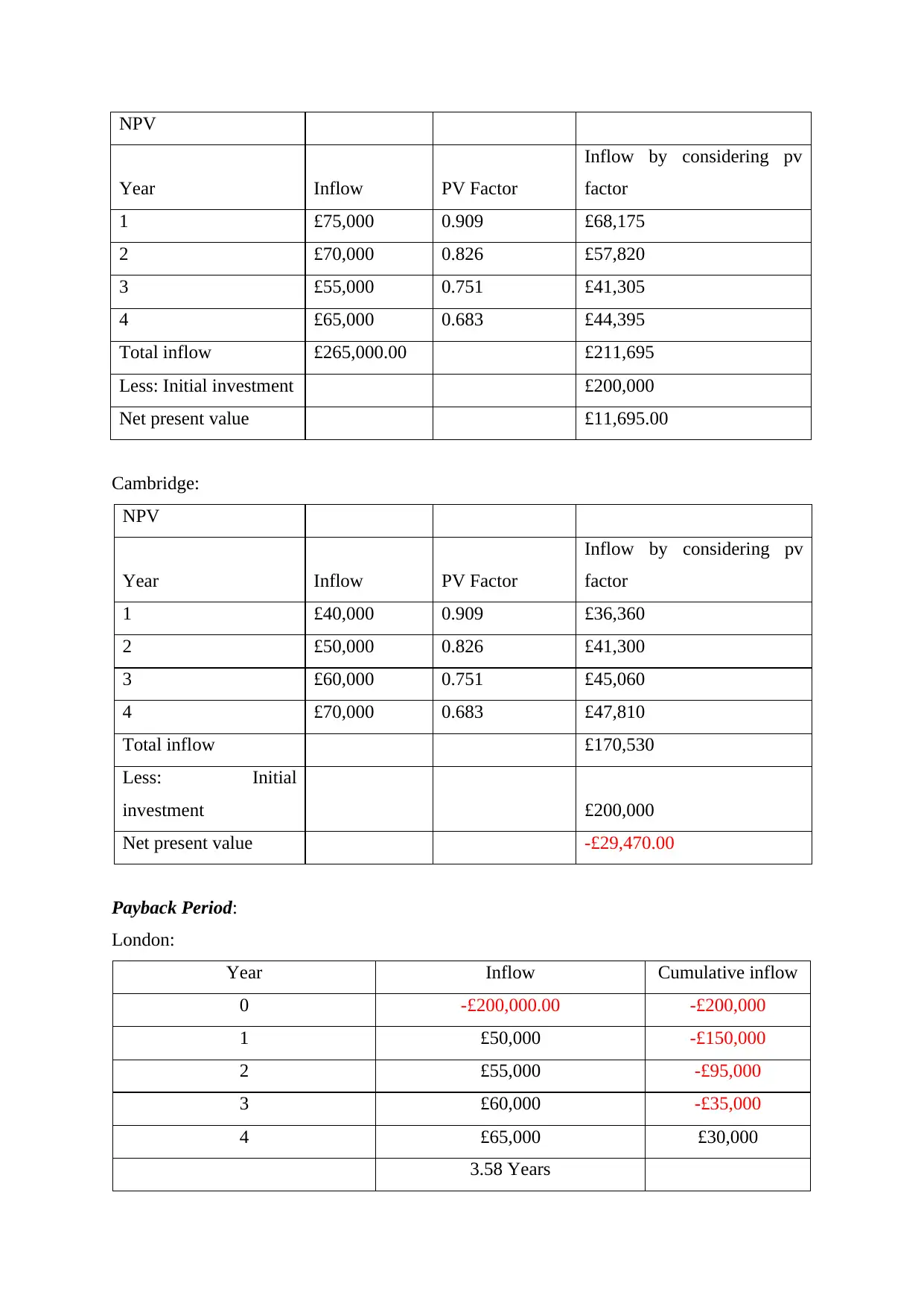
NPV
Year Inflow PV Factor
Inflow by considering pv
factor
1 £75,000 0.909 £68,175
2 £70,000 0.826 £57,820
3 £55,000 0.751 £41,305
4 £65,000 0.683 £44,395
Total inflow £265,000.00 £211,695
Less: Initial investment £200,000
Net present value £11,695.00
Cambridge:
NPV
Year Inflow PV Factor
Inflow by considering pv
factor
1 £40,000 0.909 £36,360
2 £50,000 0.826 £41,300
3 £60,000 0.751 £45,060
4 £70,000 0.683 £47,810
Total inflow £170,530
Less: Initial
investment £200,000
Net present value -£29,470.00
Payback Period:
London:
Year Inflow Cumulative inflow
0 -£200,000.00 -£200,000
1 £50,000 -£150,000
2 £55,000 -£95,000
3 £60,000 -£35,000
4 £65,000 £30,000
3.58 Years
Year Inflow PV Factor
Inflow by considering pv
factor
1 £75,000 0.909 £68,175
2 £70,000 0.826 £57,820
3 £55,000 0.751 £41,305
4 £65,000 0.683 £44,395
Total inflow £265,000.00 £211,695
Less: Initial investment £200,000
Net present value £11,695.00
Cambridge:
NPV
Year Inflow PV Factor
Inflow by considering pv
factor
1 £40,000 0.909 £36,360
2 £50,000 0.826 £41,300
3 £60,000 0.751 £45,060
4 £70,000 0.683 £47,810
Total inflow £170,530
Less: Initial
investment £200,000
Net present value -£29,470.00
Payback Period:
London:
Year Inflow Cumulative inflow
0 -£200,000.00 -£200,000
1 £50,000 -£150,000
2 £55,000 -£95,000
3 £60,000 -£35,000
4 £65,000 £30,000
3.58 Years
Paraphrase This Document
Need a fresh take? Get an instant paraphrase of this document with our AI Paraphraser
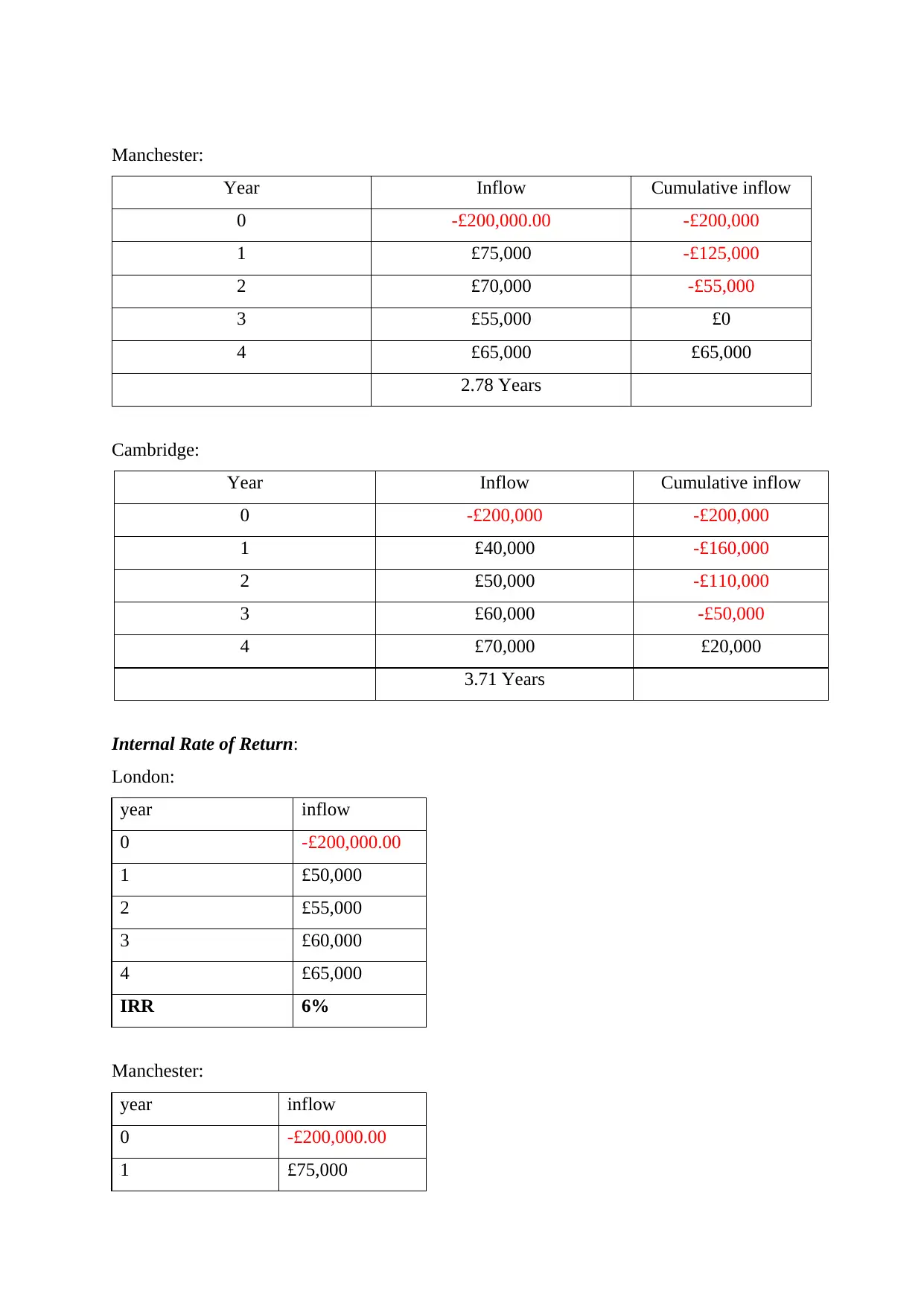
Manchester:
Year Inflow Cumulative inflow
0 -£200,000.00 -£200,000
1 £75,000 -£125,000
2 £70,000 -£55,000
3 £55,000 £0
4 £65,000 £65,000
2.78 Years
Cambridge:
Year Inflow Cumulative inflow
0 -£200,000 -£200,000
1 £40,000 -£160,000
2 £50,000 -£110,000
3 £60,000 -£50,000
4 £70,000 £20,000
3.71 Years
Internal Rate of Return:
London:
year inflow
0 -£200,000.00
1 £50,000
2 £55,000
3 £60,000
4 £65,000
IRR 6%
Manchester:
year inflow
0 -£200,000.00
1 £75,000
Year Inflow Cumulative inflow
0 -£200,000.00 -£200,000
1 £75,000 -£125,000
2 £70,000 -£55,000
3 £55,000 £0
4 £65,000 £65,000
2.78 Years
Cambridge:
Year Inflow Cumulative inflow
0 -£200,000 -£200,000
1 £40,000 -£160,000
2 £50,000 -£110,000
3 £60,000 -£50,000
4 £70,000 £20,000
3.71 Years
Internal Rate of Return:
London:
year inflow
0 -£200,000.00
1 £50,000
2 £55,000
3 £60,000
4 £65,000
IRR 6%
Manchester:
year inflow
0 -£200,000.00
1 £75,000
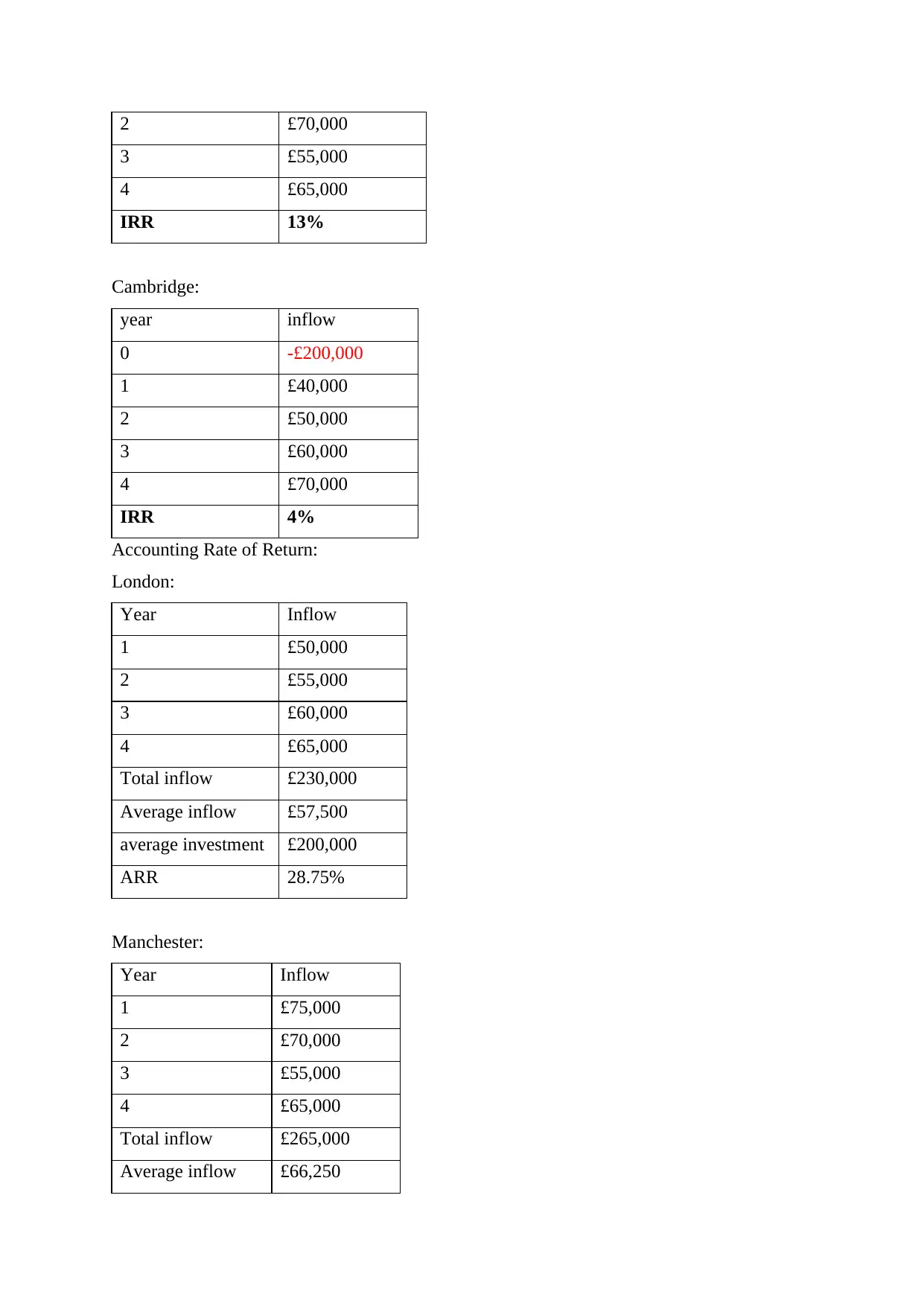
2 £70,000
3 £55,000
4 £65,000
IRR 13%
Cambridge:
year inflow
0 -£200,000
1 £40,000
2 £50,000
3 £60,000
4 £70,000
IRR 4%
Accounting Rate of Return:
London:
Year Inflow
1 £50,000
2 £55,000
3 £60,000
4 £65,000
Total inflow £230,000
Average inflow £57,500
average investment £200,000
ARR 28.75%
Manchester:
Year Inflow
1 £75,000
2 £70,000
3 £55,000
4 £65,000
Total inflow £265,000
Average inflow £66,250
3 £55,000
4 £65,000
IRR 13%
Cambridge:
year inflow
0 -£200,000
1 £40,000
2 £50,000
3 £60,000
4 £70,000
IRR 4%
Accounting Rate of Return:
London:
Year Inflow
1 £50,000
2 £55,000
3 £60,000
4 £65,000
Total inflow £230,000
Average inflow £57,500
average investment £200,000
ARR 28.75%
Manchester:
Year Inflow
1 £75,000
2 £70,000
3 £55,000
4 £65,000
Total inflow £265,000
Average inflow £66,250
⊘ This is a preview!⊘
Do you want full access?
Subscribe today to unlock all pages.

Trusted by 1+ million students worldwide
1 out of 17
Related Documents
Your All-in-One AI-Powered Toolkit for Academic Success.
+13062052269
info@desklib.com
Available 24*7 on WhatsApp / Email
![[object Object]](/_next/static/media/star-bottom.7253800d.svg)
Unlock your academic potential
Copyright © 2020–2026 A2Z Services. All Rights Reserved. Developed and managed by ZUCOL.




